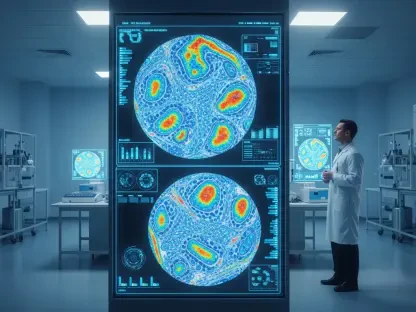The rise of artificial intelligence in healthcare is reshaping the boundaries of possibility, resulting in cutting-edge solutions that promise to redefine patient care dynamics. Leading academic medical centers are exploring innovative learning health systems powered by AI to streamline data from electronic health records and clinical trials, ensuring that patient treatment strategies are continually updated with the latest insights. This technological advancement is not merely a futuristic concept—it is a pressing necessity driven by the financial challenges and heightened expectations faced by healthcare providers in this digital age.
AI in Healthcare’s Progressive Evolution
AI’s transformative role in healthcare represents a dynamic evolution meeting modern society’s demands for precision and efficiency. The research underscores the significance of data-driven improvements in the sector, as academic health systems seek to refine patient care quality while grappling with rising operational costs. The imperative to adopt AI-driven methodologies is increasingly undeniable. This evolution is critical, as the ability to swiftly translate raw patient data into actionable insights equips healthcare providers to navigate complex decision-making processes in real time.
Methodology, Findings, and Implications
Methodology
The research methodology incorporated advanced data analytics and AI algorithms to dissect large datasets within academic health centers. By focusing on streamlining electronic health record information and integrating clinical trial data into cohesive insights, researchers were able to identify patterns, optimize resource allocation, and enhance care protocols. This strategic approach leveraged machine learning to automate data processing, ensuring rapid turnaround times and high precision in outcome assessments.
Findings
Findings revealed that AI-powered learning systems could drastically reduce traditional timelines for analyzing clinical data, shifting from years to mere weeks for meaningful insight acquisition. The continuous real-time evaluation of patient data enables healthcare providers to adapt swiftly to emerging trends, thereby improving treatment guidelines and enhancing safety measures. Furthermore, the ability to identify cost-effective interventions supports financial stability across healthcare institutions, providing a competitive edge in an increasingly demanding market landscape.
Implications
Implications of these findings suggest sweeping benefits, spanning improved patient outcomes, more efficient resource management, and economic viability amid rising research costs. The integration of AI within healthcare systems heralds practical advancements like personalized patient care and early detection of illnesses. Academic medical centers can harness these insights to tailor treatments uniquely suited to individual patient histories, thus fostering a more informed approach to health management. Socially, the promise of better quality care aligns with the growing public demand for personalized medical experiences.
Reflection and Future Directions
Reflection
Reflecting upon the study’s development, researchers encountered challenges regarding data silos and insufficient system integration within healthcare structures. Solutions centered on interdisciplinary collaboration and innovative data-sharing strategies. These obstacles highlighted areas for potential expansion, including more robust cross-platform communication methods and deeper integration of clinical care with educational and research initiatives.
Future Directions
Future research should orient toward overcoming remaining technical barriers and fostering enhanced symbiotic relationships between AI algorithms and healthcare professionals. Investigating ways AI can further personalize health education and training for upcoming professionals remains a vital area for exploration. Additionally, delving into AI’s potential to revolutionize healthcare logistics and infrastructure could unlock new pathways for systemic optimization and expansion.
Conclusion
AI-powered learning systems have demonstrated their capacity to revolutionize patient care within academic medical centers. The study’s outcomes indicate a compelling need for healthcare institutions to embrace these innovative systems to enhance patient outcomes, streamline operations, and maintain market competitiveness. Looking ahead, fostering seamless integration of AI with clinical practices offers promising prospects for healthcare evolution, paving the path to a smarter, more equitable, and efficient model of care delivery.









